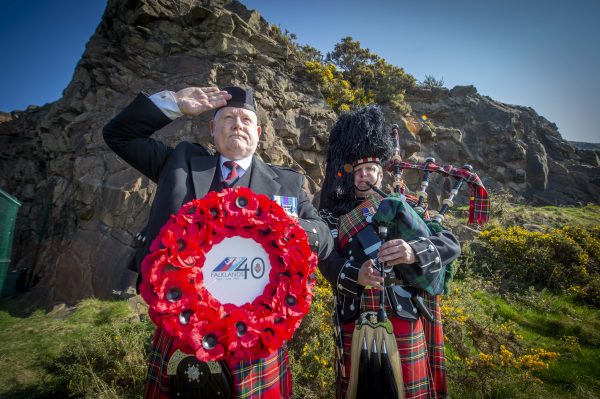The daughter of a Scottish Pipe Major, whose famous tune pays tribute to those who fell in the Falklands, has spoken of the war’s lasting impact on her family.
On Saturday 18 June, hundreds of pipers in Edinburgh and around the world will join in unison by playing “The Crags of Tumbledown Mountain” to mark the 40th anniversary of the ceasefire.
The tune was composed on the back of a ration pack by Pipe Major James Riddell while under fire during the decisive battle, in which eight fellow Scots Guards were killed. Shortly afterwards, he climbed to the top of the mountain to play it for the first time.
Musicians from across the UK, and as far away as Peru, New Zealand, and the Falklands, will play in unison at 11am on Saturday. This is part of a day of remembrance events, organised by Legion Scotland and Poppyscotland, in partnership with the Scottish Government and Armed Forces.
Veterans will also join a parade through the centre of Edinburgh, attended by Edinburgh’s Lord Provost Robert Aldridge, Cabinet Secretary for Justice and Veterans Keith Brown MSP, and heads of all three Armed Forces, before a service of remembrance followed by entertainment in St Andrew’s Square.
Forty years on, Pipe Major Riddell’s daughter Teri Newell said the tune still brings a tear to her eye, and brings back bittersweet memories of her father, who died in 1997.
She said that he had returned “a different man” after the Falklands, and there had been a lack of support for many veterans who had struggled with their experiences.
She said:
“He seemed like a stranger, not my dad. He became more insular and never spoke about his experiences. I’m almost certain he had post-traumatic stress disorder (PTSD), but it wasn’t recognised at the time. There was a lot of support for service families, but very little for the men. There was that attitude that you kept a stiff upper lip and just got on with it.”
Born in Stonehaven, Pipe Major Riddell joined the Scots Guards aged 17, following in his father’s footsteps. He married his high school sweetheart, Pauline, and served in Malaya, Borneo, and Northern Ireland. Teri, their only child, was 14 when he was sent to the Falklands, and living at Chelsea Barracks with other military families.
She said:
“I was used to him being away, but this time it felt different. It was really quite scary. He was going off to war and I didn’t know if I’d ever see him again. Every day I would come home from school hoping there was something from Dad. But you just had to get on with life.
“When we heard about the ceasefire it was the most fabulous news. But then the next day came the announcement of the fatalities. My mum remembers that, almost in a heartbeat, they went from elation to immense sadness. It was surreal – we wanted to celebrate but then we had friends and neighbours who had lost their husbands and fathers.”
Pipe Major Riddell was part of the 2nd Battalion, Scots Guards who attacked Argentinian forces on Tumbledown Mountain on June 13th, which guarded the approach to the Falklands capital, Stanley. They engaged in fierce, hand-to-hand combat for almost nine hours in dark, freezing conditions, before finally taking the stronghold. This led to the Argentinian surrender the following day.
A few weeks later, the families travelled to RAF Brize Norton to be reunited with the returning soldiers.
She said:
“It was wonderful seeing my dad in the flesh again,” she said. “But he hardly ever spoke about what he’d been through.
“Later on, he told me he’d scribbled the tune on the back of a ration pack. He told me it just came to him. Things were obviously going through his head at the time, then it all came together.”
Pipe Major Riddell served for 28 years, leaving in 1991 with an exemplary conduct assessment. His comrades remember him as well-respected and protective of the pipers under his command, although he could be a tough task master.
But he found himself struggling to adapt to civilian life, and the family became estranged when Teri was in her 20s. He died of a brain tumour in 1997.
She said:
“When he left the military, he found it a very hard transition. He had been a soldier for all his adult life and was used to that structure and following orders. I think being on his own and having to find a job was a very scary prospect.
“I only spoke to him a handful of times after that, but he kept my number. Then one day, I got a phone call saying he had passed away. I didn’t even know he had been ill. That was the worst day of my lfe.”
She now lives in Slough with her husband Eric and is proud that her father’s memory lives on through his music.
“It’s amazing that so many pipers will be playing it on Saturday, it really warms my heart. Whenever I hear it, it brings a tear to my eye and reminds me of him. He was never interested in recognition, he didn’t want to be in the spotlight. But his tune means a lot to people around the world.”
Hundreds of current and former servicemen and their families are expected to take part in Saturday’s parade (JUNE 18th), starting at 10:15am from Charlotte Square. It will be led by the Band of Her Majesty’s Royal Marines and the Scots Guards Association Pipes and Drums, with the pipers’ tribute taking place at 11am.
There will be a service in St Andrew Square, jointly led by the National Chaplain of the Royal British Legion Scotland The Rev Karen Campbell and The Rev Angus Smith, former Padre to the 2nd Battalion Scots Guards who served in the Falklands. This will be followed by performances by both military bands, Legion Scotland Sweetheart Amy Hawthorn, Stuart McLean, Juniper 3 and Ellyn Oliver.
For more information of the Falklands 40 commemorative events programme visit www.poppyscotland.org.uk/Falklands40.



















